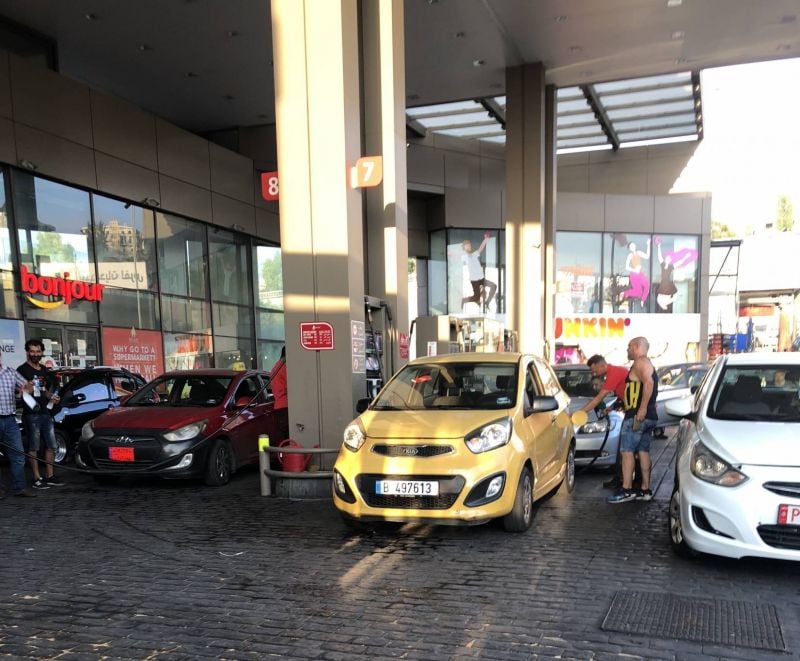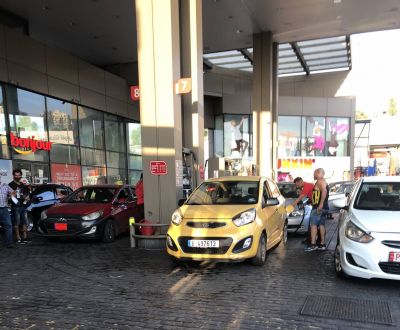
For the first time in several weeks, the lines at gas stations appear to have eased. (Credit: Philippe Hage Boutros/L’Orient-Le Jour)
For the first time in several weeks, the lines at gas stations appear to have eased, and are now just a few cars long instead of spilling out onto the streets.
The about-face at the pumps comes a week after subsidies for gasoline, diesel and domestic gas were almost completely halted.
The situation last eased at the end of June, when Banque du Liban began opening credit lines for importers, providing them with subsidized dollars to cover the cost of their goods, according to Georges Brax, the gas station owners syndicate spokesperson.
But with the total end to subsidies looming — expected as soon as today — the fuel situation’s immediate future hangs in the balance, even for those working in the sector, said Maroun Chammas, the managing director at Medco, a petroleum company.
Smuggling to Syria
Since October 2019, BDL has subsidized essential imports, including fuel, through a series of mechanisms whereby it provides importers with dollars at a lower rate than the parallel market exchange rate.
This mechanism in principle prevents products’ prices from increasing in terms of lira downstream, as the national currency rapidly depreciates.
In October 2019, BDL subsidized 90 percent of suppliers’ invoices at the official rate of LL1,507.5 to the dollar. At the end of June, the subsidy rate was hiked to 100 percent at LL3,900, then to LL8,000 at the end of August and finally reached LL14,000 last week.
As the rate at which BDL provides importers with dollars has inched closer to the parallel market price, prices at the pump have followed the same upward curve, which helps explain the reduced congestion at gas stations, according to Chammas.
He explained that it has become less profitable for fuel smugglers who siphon off petrol from gas stations to queue for long hours to fill up jugs and resell them at higher prices.
At the current prices, a 20-liter tank now costs more than LL200,000, which means paying more than LL600,000 to refuel a 60-liters capacity car.
Chammas stressed, however, that price increases are insufficient to completely stop fuel smuggling.
He said 20 liters of fuel cost nearly $13 in Lebanon, compared with $18–$19 in Syria, which could continue to encourage smuggling into the Syrian market.
Brax expressed the same concerns as Chammas, adding that as long as Syria is subject to international sanctions and import restrictions, part of Lebanon’s fuel will end up there.
Additional imports
The calmer situation at pumps could also be the result of the arrival of more than 90 million liters of petrol, following BDL’s approval of the imports.
This has led a number of stations to reopen, according to Brax and two other sources from distribution companies, who declined to be named. However, one clarified that some areas are serviced less for “security reasons,” especially in Akkar and Beirut’s southern suburbs.
While Chammas and Brax could not comment on the future of subsidies, former Premier Hassan Diab said on two occasions they would end in late September.
Chammas said he believes that the delay in announcing the decision is directly correlated with a delay in launching the ration card for vulnerable families. The program is supposed to provide cash dollars to some 500,000 families in need, but it has stalled as its implementation mechanism is being ironed out.
Social Affairs Minister Hector Hajjar said several ministers are working out “the mechanism and criteria to implement it.” Economy and Trade Minister Amine Salam said on Monday after a meeting with Prime Minister Najib Mikati that the draft law is expected to be signed “in the coming days.” Parliament’s National Economy, Trade, Industry and Planning Committee will meet today at 11 a.m. to follow up on the ration card and “work to overcome obstacles.”
The mechanism is still vague
While a final decision has not been announced on the future of fuel subsidies, the available gasoline stock can last “for 15 days,” according to Brax. Another distributor, who declined to be named, indicated that he can supply his network only “until next Monday” unless BDL approves the new invoices for imports and pays out previous ones.
Is BDL going to continue to provide dollars to fuel importers, even if it does so at the parallel market rate, or will the authorities force them to resort to the parallel market to secure them? This is now the most important question.
A source familiar with the issue indicated that BDL would rather follow the first course of action, which would result in BDL controlling the banknotes and coins in circulation and allow it to absorb part of the lira available on the market, thereby stabilizing the exchange rate.
Meanwhile, negotiations between the gas station owners syndicate and the Energy Ministry are underway, Brax said. He said the syndicate hopes to increase the upfront sales commissions payable on the sale of 20 liters of fuel from LL6,000 to LL20,000 to ensure the maintenance of their equipment, on the grounds that “the commission amounted to $1.63 prior to the [onset of the] crisis in 2019.”
This article was originally published in French in L’Orient-Le Jour. Translation by Sahar Ghoussoub and Joelle El Khoury.
